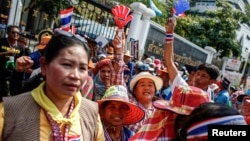BANGKOK —
Key intersections in the Thai capital, Bangkok, shut down by anti-government protests since mid-January, reopened to traffic Monday as demonstrations consolidated at a single site. An easing of tensions was welcomed by small business and property owners affected by the protests and fears of violence.
The anti-government campaign led by former lawmaker Suthep Thaugsuban and the People's Democratic Reform Council included occupations of ministries and state agencies and led Prime Minister Yingluck Shinawatra to declare a state of emergency.
The protest stages in the city, built for speakers and entertainment, forced vehicles to reroute, often resulting in traffic heavy congestion. All activities have now been consolidated in a central park.
Akanat Promphan, a PDRC spokesman, said the consolidation is intended to ease concerns over attacks on the rally sites by unknown gunmen.
"This move was decided based purely to reduce the effect on Bangkok people. We're not doing any more by staying on the streets, by staying on junctures which is creating problems for Bangkok people," Promphan stated. "With the violence escalating with the M79 grenade being shot at protesters it's sensible to one single venue."
The attacks on two protest sites - at Rayong and Bangkok - killed four small children and had a deep impact on the community. U.S. Secretary of State John Kerry, in a statement, called the children's deaths "particularly horrifying".
More than 20 people have died and at least 700 have been injured since the protests first began in November.
The end of the street-blocking protests has enabled nearby malls to again be active with lunchtime shoppers. Small business owners are still weighing the cost of the shutdown.
Print shop manager Khun Oud said it may take several months before his business fully recovers.
"My income lose ...80 percent of income in the month. Maybe to recover it will take more time like two to three months," he said. "The people stayed away because my custumer - 50 percent is not Thai or Thai business so when we have the protest everyone cannot come to do anything in this area."
Senior Thai Finance Ministry officials warned Monday the economy may slow to 2 percent growth in 2014 due to the delay in government spending and slower export growth caused by the poor political climate.
But Thai stocks were reported higher Monday, adding some grounds for optimism on the speed of the recovery.
Thailand's political uncertainties remain acute. There is still no sitting parliament a month after inconclusive national elections, boycotted by the opposition Democrat Party. However, there is some thought that the consolidation of the protest sites may make talks between the government and the opposition more likely in the near future.
Yingluck is also facing the threat of Senate impeachment over her role in overseeing a rice price support scheme analysts say was engulfed by corruption.
The anti-government campaign led by former lawmaker Suthep Thaugsuban and the People's Democratic Reform Council included occupations of ministries and state agencies and led Prime Minister Yingluck Shinawatra to declare a state of emergency.
The protest stages in the city, built for speakers and entertainment, forced vehicles to reroute, often resulting in traffic heavy congestion. All activities have now been consolidated in a central park.
Akanat Promphan, a PDRC spokesman, said the consolidation is intended to ease concerns over attacks on the rally sites by unknown gunmen.
"This move was decided based purely to reduce the effect on Bangkok people. We're not doing any more by staying on the streets, by staying on junctures which is creating problems for Bangkok people," Promphan stated. "With the violence escalating with the M79 grenade being shot at protesters it's sensible to one single venue."
The attacks on two protest sites - at Rayong and Bangkok - killed four small children and had a deep impact on the community. U.S. Secretary of State John Kerry, in a statement, called the children's deaths "particularly horrifying".
More than 20 people have died and at least 700 have been injured since the protests first began in November.
The end of the street-blocking protests has enabled nearby malls to again be active with lunchtime shoppers. Small business owners are still weighing the cost of the shutdown.
Print shop manager Khun Oud said it may take several months before his business fully recovers.
"My income lose ...80 percent of income in the month. Maybe to recover it will take more time like two to three months," he said. "The people stayed away because my custumer - 50 percent is not Thai or Thai business so when we have the protest everyone cannot come to do anything in this area."
Senior Thai Finance Ministry officials warned Monday the economy may slow to 2 percent growth in 2014 due to the delay in government spending and slower export growth caused by the poor political climate.
But Thai stocks were reported higher Monday, adding some grounds for optimism on the speed of the recovery.
Thailand's political uncertainties remain acute. There is still no sitting parliament a month after inconclusive national elections, boycotted by the opposition Democrat Party. However, there is some thought that the consolidation of the protest sites may make talks between the government and the opposition more likely in the near future.
Yingluck is also facing the threat of Senate impeachment over her role in overseeing a rice price support scheme analysts say was engulfed by corruption.




